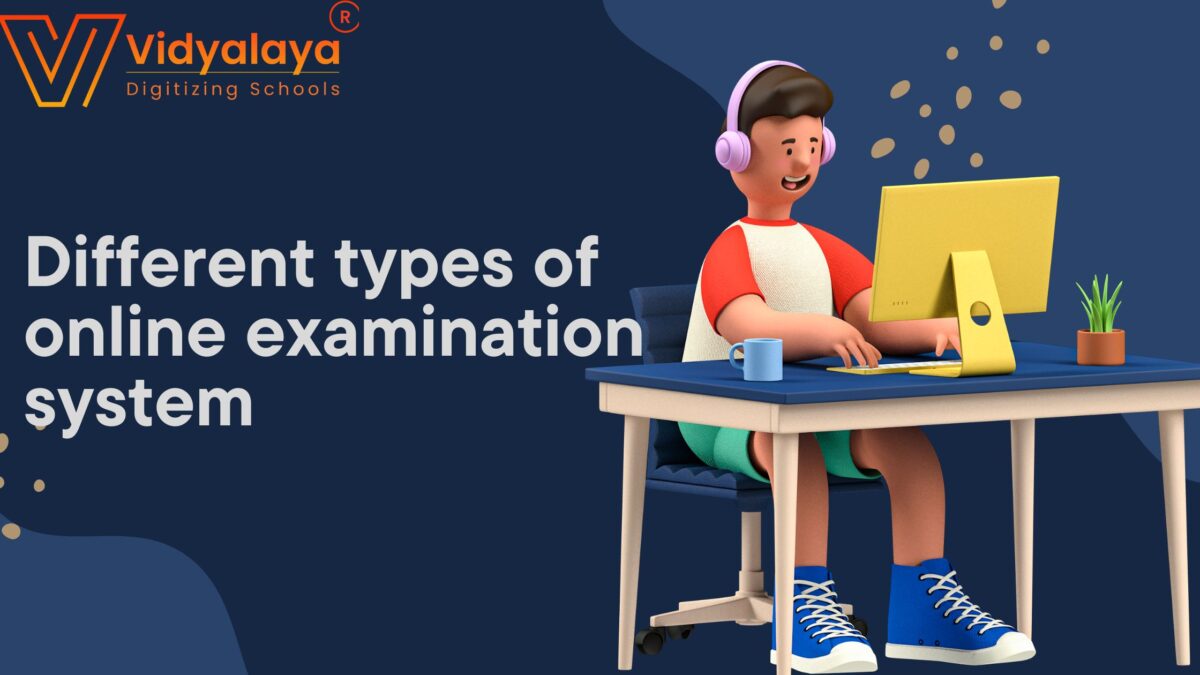Vidyalaya Campus ERP is a comprehensive educational management platform designed to help schools and colleges streamline their administrative and academic processes. One of the standout features of Vidyalaya is its online examination system, which allows educational institutions to conduct exams digitally and evaluate student performance in real time.
This system is a convenient and efficient way for schools and colleges to administer exams and assess student progress and can be used in a variety of settings, including in-person and remote learning environments. With its powerful and user-friendly features, Vidyalaya’s online examination system is a valuable tool for educators looking to streamline their exam processes and better understand the strengths and weaknesses of their students.
In this blog, we will explore the different types of online examination systems available in Vidyalaya and how they can benefit educational institutions.
Multiple choice exams, which are a popular type of online examination system in Vidyalaya, consist of a series of questions with multiple choices for students to select from. These exams are efficient at assessing students’ knowledge and understanding of a subject, as they can cover a broad range of topics in a relatively short period of time. To complete a multiple-choice exam, students must identify the correct answer among the options provided.
True/false exams, which are similar to multiple choice exams, require students to determine whether a statement is true or false. These exams are useful for evaluating students’ comprehension of factual information and their ability to use logical reasoning. Unlike multiple choice exams, true/false exams only provide two options for students to choose from.
Fill-in-the-blank exams consist of sentences with blank spaces that students must fill in with the correct word or phrase. These exams are effective at testing students’ vocabulary and their ability to use context clues to determine the appropriate word. Fill-in-the-blank exams can be a good way to assess students’ language skills and their understanding of language structure.
Short answer exams require students to write a brief, written response to a question. These exams are more time-consuming than multiple choice or true/false exams, but they provide a deeper understanding of student’s knowledge and critical thinking skills. Short answer exams are an effective way to assess students’ understanding of a subject and their ability to communicate their thoughts and ideas in writing.
Essay exams require students to write a longer, more in-depth response to a prompt or question. These exams are useful for evaluating students’ writing skills, their ability to develop and defend an argument, and their understanding of complex concepts. Essay exams are a good way to assess students’ ability to organize and present their ideas in a clear and coherent manner.
Matching exams consist of a list of items on one side of the page and a list of corresponding items on the other side. To complete a matching exam, students must correctly match the items. These exams are a good way to test students’ memory and their ability to recognize patterns and relationships. Matching exams can be useful for evaluating students’ understanding of key concepts and their ability to remember important details.
Drag-and-drop exams: Drag-and-drop exams consist of items that students must arrange in a specific order or place in designated areas on the screen. These exams are a fun and interactive way to test students’ spatial reasoning skills and their ability to follow instructions.
Audio/visual exams are a type of assessment that ask students to demonstrate their understanding of media by listening to or watching a clip and answering related questions. These exams are designed to evaluate a student’s ability to comprehend and interpret audio or visual content and may involve tasks such as analyzing the media or explaining the key points presented. Audio/visual exams are an effective way to test students’ skills in these areas and can be a useful tool for educators looking to assess their students’ comprehension and interpretation abilities.
Simulation exams are a type of assessment that ask students to complete a virtual task or work through a simulated environment. These exams are designed to test students’ problem-solving skills and their ability to apply their knowledge in a realistic setting. Simulation exams can be a useful tool for educators to evaluate students’ ability to think critically and creatively, and to apply their knowledge to real-world situations. These exams can be particularly useful in fields where hands-on experience is important, such as in science, technology, engineering, and math.
Case study exams are a type of assessment that involve presenting students with a real-world scenario and asking them to apply their knowledge and problem-solving skills to come up with a solution. These exams are designed to test students’ critical thinking and decision-making abilities and are often used in fields such as business, law, and healthcare where these skills are particularly important.
Case study exams can be an effective way for educators to evaluate students’ ability to analyze and interpret information, and apply their knowledge in a practical setting. These exams can also be useful tools for helping students to develop their problem-solving and decision-making skills.
In summary, Vidyalaya campus ERP offers a range of online examination systems that can be used by educational institutions to conduct exams and evaluate student performance. These systems, also known as online exam software or online exam system, come in a variety of formats and are designed to cater to different learning styles and test various skills. By using these systems, educational institutions can administer exams efficiently and accurately assess student progress.
These systems offer a convenient and effective way for educators to evaluate student performance and can be used in a variety of settings, including in-person and remote learning environments. Some of the different types of online exams that are available include multiple choice exams, audio/visual exams, simulation exams, and case study exams. Each of these exam formats is designed to test different skills and can be useful in assessing students’ knowledge and abilities in a variety of subjects and fields.


